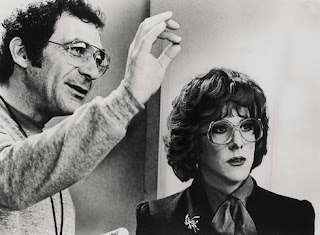Werth: Hello, Wise. I assume you've been ogling over the Oscar noms this week.
Wise: I was pleased to see that my fellow alum Glenn Close scored a sixth nom for her work in Albert Nobbs. Her chances at taking home the gold seem pretty good. Even The Huffington Post was excited enough to publish a piece about other women who have taken on trouser roles.
Werth: I love Glenn Close, but there's no way she'll be taking home the statuette this year. It's all about the Meryl... or the Viola... or the Michelle.
But speaking of cross-dressing roles that earned Oscar noms, the king/queen of drag films has to be 1982's Tootise. With ten nominations and one win, Tootsie stars Dustin Hoffman as Michael Dorsey, a frustrated, struggling character actor who knows how to play a part, but doesn't know how to be himself. He really creates an identity crisis when he decides to prove to his agent he is castable by auditioning for a part in soap opera Southwest General... as a woman.
Wise: Is that how Katherine Heigl booked Grey's Anatomy?
Werth: Dorsey gets the part, but finds that playing the role of hospital administrator Emily Kimberly is nothing compared to playing the role of his drag-ego Dorothy Michaels. What starts off as a satire of the acting world turns into a heartfelt romantic comedy with lots of love angles.
Dorsey falls in love with castmate Julie (Jessica Lange) whose father Les (Charles Durning) falls in love with Dorothy, who has to make sure that Sandy (Teri Garr), who is in love with Michael doesn't find out that Michael is Dorothy while Dorothy avoids the advances of soap-star John Van Horn (George Gaynes).
Wise: I got whiplash just from reading that.
Dorothy's reveal scene where she/he sheds the character live on the set of Southwest General is one of the most memorable moments on film, not just for the situation, but for how brilliantly Hoffman navigates between two seemingly real people.
Wise: If only he'd coached the Wayans Brothers before they made White Chicks.
Werth: Tootsie's script by Larry Gelbart and Murray Schisgal is airtight and full of the kind of lines comic actors kill for—and boy is the cast full of killers. Bill Murray is hysterical as Michael's morose playwright roommate Jeff (it is said that he improvised his lines). Garr is a riot as the perkily neurotic Sandy.
Lange earned an Oscar for playing Julie as a jaded-but-vulnerable soap-stress. Durning, Gaynes, Dabney Coleman, Geena Davis, and Doris Belack show how good character acting can elevate even the smallest of roles.
And Sydney Pollack not only seamlessly directed this awesome cast, but put in a stellar performance himself as beleaugured agent George Fields who believes, "A tomato doesn't have logic!"
Wise: Although this tomato had a penis.
Werth: And with fantastic NYC location shots and an 80's soundtrack with enough saxophone to choke Kenny G, Tootsie is one of those must-see classics that will have you laughing your wig off.
Wise: Wig-wearing is beside the point in the gleefully absurd Girls Will Be Girls (2003). Starring drag queens Evie Harris (Jack Potnick), Miss Coco Peru (Clinton Leupp) and Varla Jean Merman (Jeffery Roberson), the film never acknowledges that these are men in drag.
Werth: I won't even acknowledge that this is a real film.
Wise: All three characters existed long before the movie was made, and that process of honing these personalities through performance—Evie as the drunk has-been; Coco as the girl with big dreams and bad luck; Varla as the small-town girl determined to make it—lends each of them a certain verisimilitude. I mean, no one is going to mistake any of them for some Disney Channel 'tween queen—
Werth: Although Venessa Hudgens has been looking a little burly lately.
Wise: The plot is nonsense—the script cribs from all manner of classic Hollywood camp—but writer/director Richard Day (who cut his teeth producing for Ellen, The Drew Carey Show and Arrested Development) keeps the jokes and dramatic twists at a cheerful clip, never letting the action get bogged down.
Werth: It's like an evening at Lucky Cheng's—without the two drink minimum.
Wise: It's certainly not a great movie, but it does have a cheerful panache that stems, I think, from the actors' refusal to wink knowingly at the audience. And while I have trouble believing that genuine camp can be created rather than found, these ladies exert themselves manfully in maintaining the illusion that they're just as real as any Hollywood star.
Werth: Well, at least as real as any star in Wigstock: the Movie (1995).
Wise: Just as long as you keep it real and meet us back here next week for more Film Gab.
 |
| Young Werth practicing for his future Film Gab. |

































